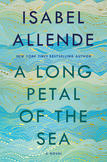Isabel Allende’s timely new novel unveils the lifelong effects of war
By the time Isabel Allende’s A Long Petal of the Sea opens in 1938, half a million refugees have begun to walk from Spain across the French border, fleeing from their own homeland in order to escape Francisco Franco’s violence. The novel begins with violent displacement, describing in detail the families ripped apart and soldiers killed in battle through one family’s story of survival and hope.
A member of the Republican army, the 23-year-old medical student Victor Dalmau is among the refugees; and although he loses track of his mother and brother, presuming them both dead, he finds (and spends the next several decades holding onto) Roser Brughera, the mother of his brother’s son. The entwined lives of Victor and Roser make up the arc of Allende’s new novel, their loss and rebuilding spanning continents and wars as they cling to each other, each character becoming the only place the other truly belongs.
Writing a novel of profound displacement can, perhaps, best be done by someone who knows this as her permanent state. Allende has been a foreigner since her birth, when her parents were Chilean diplomats, and later when she was a political refugee following Pinochet’s 1973 coup in Chile. Allende lives now in California, displaced not only from the physical home of her ancestors, but from the language, history and culture she carries with her. In fact, this sense of not belonging is the recurring core of much of Allende’s fiction, and it situates her identity as a Latin American writer within larger transnational literary traditions. “The theme of displacement is very natural for me,” Allende told The Guardian in 2015. “It always comes up in my books because I have been a foreigner all my life, and I don’t feel I belong anywhere. I’m an immigrant.”
Isabel Allende has been a foreigner since her birth, when her parents were Chilean diplomats, and later when she was a political refugee following Pinochet’s 1973 coup in Chile.
Just after Victor Dalmau marries the pregnant Roser Brughera, they set sail on the SS Winnipeg. This French steamer actually existed; the Chilean president once charged the poet Pablo Neruda to fill it with Spanish refugees to whom he was offering asylum in Chile. In September of 1939, the Winnipeg set sail for Chile carrying 2,200 Spaniards who had been held in French internment camps. On the night the steamer set sail, Neruda wrote: “The critics may erase all of my poetry, if they want./ But this poem, that today I remember, nobody will be able to erase.”
In the novel, the ship docks in Valparaiso, Chile, the land that Neruda later described as “the long petal of sea and wine and snow.” There, Victor, Roser and their baby set about rebuilding their lives, finding their place in a strange, new land, and creating a sense of home in a country headed for its own unrest. “The passengers’ anxiety came close to collective hysteria: more than two thousand eager faces crowded onto the upper deck, waiting for the moment to set foot on this unknown land,” Allende writes.
In Chile, the Dalmaus’ lives intersect with a Chilean family they meet, the influential Del Solars, a conservative and devoutly Catholic family whose ideologies clash with those of the Dalmaus. Victor and Roser’s marriage is one of fraternal love and convenience—they got married so they could both escape Europe on the brink of war. But once in Chile, Victor falls in love with Ofelia Del Solar, one of the family’s daughters. The depth and complication of their love story ends quickly but the story does not completely unfurl until the novel’s final pages. For one thing, Ofelia must keep the romance a secret from her disapproving family. For another, Victor is married to Roser. “Not even the irresistible temptation of eloping with Ofelia to a palm-fronded paradise could make him leave Roser or her child,” Allende writes.
Allende grew up hearing stories of the SS Winnipeg from her grandfather, who was one of the Spanish immigrants aboard the ship. Many years later she heard similar stories from another Chilean exile in Venezuela, where she lived after Pinochet’s ascent to power, named Victor Pey. Forty years later she developed the story he had told her into A Long Petal of the Sea. The novel, she says in her acknowledgments, because of her own exhaustive research and correspondence with Pey, seemed to write itself as though it were being dictated to her. Although the story and its characters are fictionalized, the historical and personal events on which it is based make the novel read like a nonfiction account.
A Long Petal of the Sea provides a compelling look at how war can reverberate for a lifetime, how it swallows people, and even how the survivors are walking wounded.
Pey returned to Chile in 1989 once democracy was restored and General Pinochet stepped down. Pey spent years corresponding with Allende about the details of life during the Spanish Civil War and his memory of the battles, his exile to the French concentration camps that housed Spanish refugees, his voyage aboard the SS Winnipeg and arrival in Valparaiso, and his relationship with both Neruda and President Salvador Allende, Isabel Allende’s godfather and the first cousin of her father. The novel is dedicated “to Victor Pey Casado and other navigators of hope.” Pey died at the age of 103 years, less than a week before Allende’s manuscript, the novel inspired by his life, was ready to be sent to him.
The juxtapositions—of belonging and exile, sorrow and redemption, personal and political—create tension in the book that propels the narrative forward through decades and generations. Allende’s writing manages to be sweeping in its scope while maintaining its tight focus on the lives of just a few characters. The book begins with just such a juxtaposition, with Victor’s last-minute rescue of a young soldier he refers to as Lazaro. “This was to be his most stubborn, persistent memory of the war: that fifteen or sixteen year-old boy, still smooth-cheeked, filthy with the dirt of battle and dried blood, laid out on a stretcher with his heart exposed to the air,” Allende writes.
Victor reaches into the boy’s chest cavity and massages the heart, bringing him back to life. “Many called it a miracle,” Victor learns. “The advances of science and the boy’s constitution of an ox, claimed those who had renounced God and his saints.” Allende often pairs life and death within a single sentence, and thus shows Victor’s despair, which lives right alongside his ever-growing sense of purpose in the face of great terror and violence.
The multi-decade scope of the novel means Allende’s attention to historical dates, events and figures can make it difficult for some of the more emotional scenes to fully take hold. Victor’s imprisonment in Chile, for example, rushes by, the terror of his capture and confinement sacrificed in the author’s haste to move on to the next stage of political turmoil. Allende jumps over entire years within single paragraphs, and by the end of the characters’ journeys, the small moments of finding each other and reflecting on the years happen quickly and unceremoniously.
Still, the novel provides a compelling look at how war can reverberate for a lifetime, how it swallows people, and even how the survivors are walking wounded. At its heart, A Long Petal of the Sea is just that—a story of survival, and a love story between people and place, a story of how the displaced find meaning and community. It could not be more timely.
This article also appeared in print, under the headline “The reverberations of war,” in the March 2, 2020, issue.











